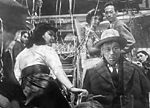HATE YOUR JOB? Think you’ve got it rough? Step into the shoes of Kanji Watanabe, a minor civil service bureaucrat who’s been pushing paper across his desk for almost 30 years. His colleagues don’t respect him. His son and daughter-in-law ignore him. His wife has been dead for decades. All he has to show for his lifetime of diligence and duty are a few crummy letters of commendation tacked to his wall. Lending to this discouraging scenario is the fact that, in postwar Japan, ordinary citizens can’t penetrate the fortress of governmental red tape that’s supposedly there to serve them.
IKIRU
directed by Akira Kurosawa
runs February 25-March 2 at Grand Illusion
In this cluttered, dingy setting, Akira Kurosawa’s classic 1952 film is both personal and political, the story of a dying man’s rediscovery of life and a deft, cynical satire of Japanese society. Played indelibly by Takashi Shimura, Watanabe is a study in forlorn, downcast, stooped suffering, his stoic posture and bewilderment reminiscent of Buster Keaton. Indeed, Watanabe rarely speaks and is most eloquent through his silent wide-eyed reaction first to his diagnosis of terminal stomach cancer and then to his son’s ingratitude. Scenes of Watanabe simply listening to other characters are breathtakingly composed in black and white. Throughout, the actors’ gazes meet in space (sometimes comprehending, sometimes not) and bear mute testimony to Watanabe’s observation that “It’s hard to die” until he learns how to live.
Initially, Watanabe abandons his job, goes on a bender with a sympathetic bohemian writer, then enjoys a chaste flirtation with a vivacious young secretary from his office. All the while we know he’s going to die, but as the narrator informs us, “He’s been dead for the last 25 years.” We expect Watanabe to give in to suicidal despair, but he surprises us—and everyone else in his life. During his one delirious night on the town, he silences a room by bursting into song. Later, after his death, his former colleagues drunkenly argue about the impetus for his legacy. While this memorial scene drags on too long, and Ikiru is dated and sentimental in places, it’s also one of the very best works by one of the great filmmakers of the century.
Kurosawa may be more associated today with The Seven Samurai (1954) and Rashomon (1950), but Ikiru now feels more contemporary than any of his sword-and-gown epics. It’s a midlife crisis movie before its time, one whose protagonist yearns for connection, meaning, and transcendence in a way that directly anticipates American Beauty and its ilk. Though Ikiru is distinctly modern in its flashbacks, editing, and camera work, it’s Kurosawa’s exquisite arrangement of expressive faces within the frame that still makes his film so powerfully moving.








